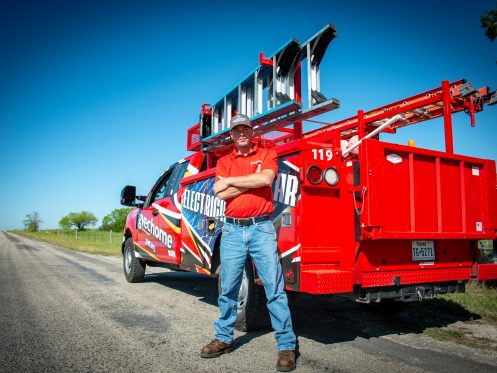July’s a month when summer is in full swing. We fill our spare time with vacations, picnics, family get-togethers, fireworks and generally spending more time outdoors. With that in mind, we’re offering tips this month to help you keep summer electrical safety a top priority.
Summer Electrical Safety Should Start at House
We encourage you to start your celebration of greater summer electrical safety by addressing the most important place in your family’s life: home. According to the Electrical Safety Foundation International (ESFI), home electrical hazards result in some 51,000 house fires each year. Such hazards include overloaded circuits, frayed cords, damaged electrical outlets, overloaded power strips and more.
July’s a Great Time for a Whole-Home Electrical Inspection
You can help prevent home electrical fires by getting your system professionally inspected every year. The professional electricians at GVEC are fully licensed and experienced in this kind of work. Our whole-home electrical inspection includes not only the visible parts of your system, but also the places you can’t see.
Water and Electricity Don’t Mix
For many, summer means more time in or around water. Wherever electricity is used near water, it’s important to be mindful of safety. Here are some poolside electrical precautions for enhanced summer electrical safety:
- Close the covers on poolside electrical outlets not in use.
- All electrical outlets near water should include a ground fault circuit interrupter (GFCI).
- All electrical equipment used for the pool should be properly grounded.
- Keep all electrical devices and cords at least 10 feet from water.
- Whenever possible, use battery-operated gear around water.
- Never handle electrical devices—even battery-operated ones—while wet.
- Situate Your Pool Well away from powerlines and never below them.
- Get your pool regularly inspected by a licensed electrician.
Boating and Summer Electrical Safety
If your summer includes excursions on a boat, electrical safety should be a priority out on the water:
- Avoid swimming near a running boat. The vessel’s electrical wiring can leak current into the water, putting swimmers at risk of electrical shock. Prevent such leakage by installing an equipment leakage circuit interrupter (ELCI).
- A tingling sensation while swimming could indicate electrified water. Swim away from the area as quickly as possible, and exit the water, avoiding the use of metal ladders.
- Know the location of boat and onshore primary electrical breakers so you can cut power quickly in an emergency.
- Get your boat’s electrical system professionally inspected every year. Test ELCIs and GFCIs monthly.
- Always maintain a distance of at least 10 feet between your boat and power lines.
- Stay off the water before, during and after thunderstorms.
- Never use standard electrical cords around water, but only UL-Marine listed shore cords with “Y” adapters.
Electrical Safety in the Yard and Garden
Summer finds many people outdoors doing yard or gardening work. If you use an electrically powered tool for such jobs—whether corded or battery operated—we suggest keeping the following safety tips in mind:
- If using a corded tool, always plug into an outlet with a built-in GFCI.
- Avoid using electric tools in or near standing water, and never use or leave them in the rain.
- Verify that plug-in tools are properly grounded before use.
- Store these tools in a dry place, with any cords properly stored to prevent damage when not in use.
- Before using a corded tool, inspect for damage to the cord; do not use if damaged.
If you plan to dig as part of summer yardwork, call 811 first—it’s the law. If you hit a powerline as part of your project, you could receive a serious shock. You could also be liable for power outages or any damage you cause.
Also be mindful of:
Padmount Transformers
Essential high-voltage electrical equipment is housed within these green steel boxes, and they require at least three-to-four feet of clearance at back and sides and a minimum of 12 feet in front. Children should never play on or near them.
Power Lines
Summer weather can produce strong thunderstorms across the GVEC service area. These storms can knock down trees, poles and sometimes powerlines. If you encounter a downed pole or powerline, don’t go near it, stay at least 30 feet away and call 911. If possible, warn others and keep them away.
Improved Summer Electrical Safety Starts with Greater Awareness
It’s easy to take electricity for granted in day-to-day life; but doing so can lead to preventable accidents. We hope these tips inspire renewed focus on electrical safety this summer.
For more tips on electrical safety, visit gvec.org. To schedule a whole-home electrical inspection, call 888.590.7773 .



